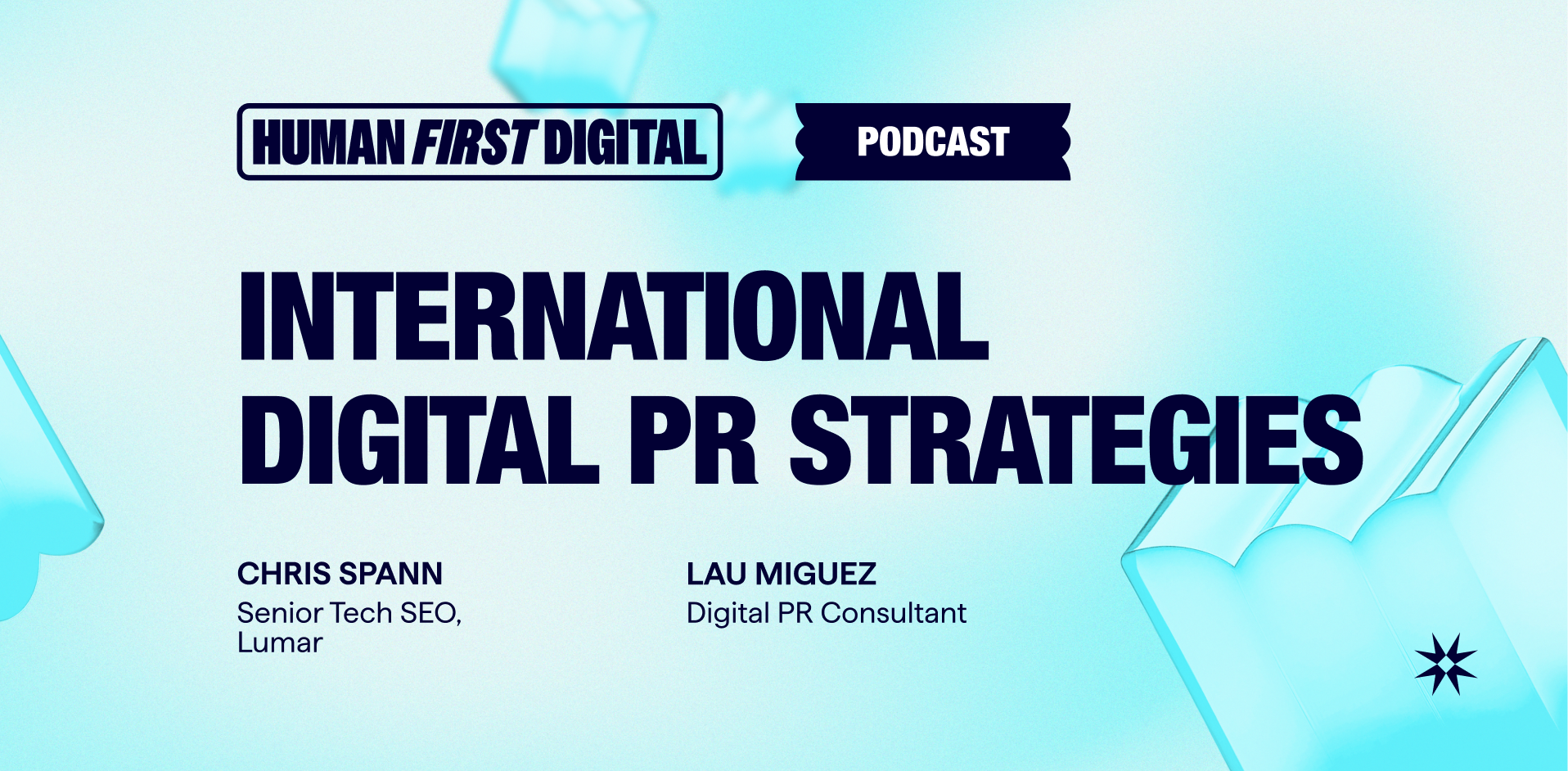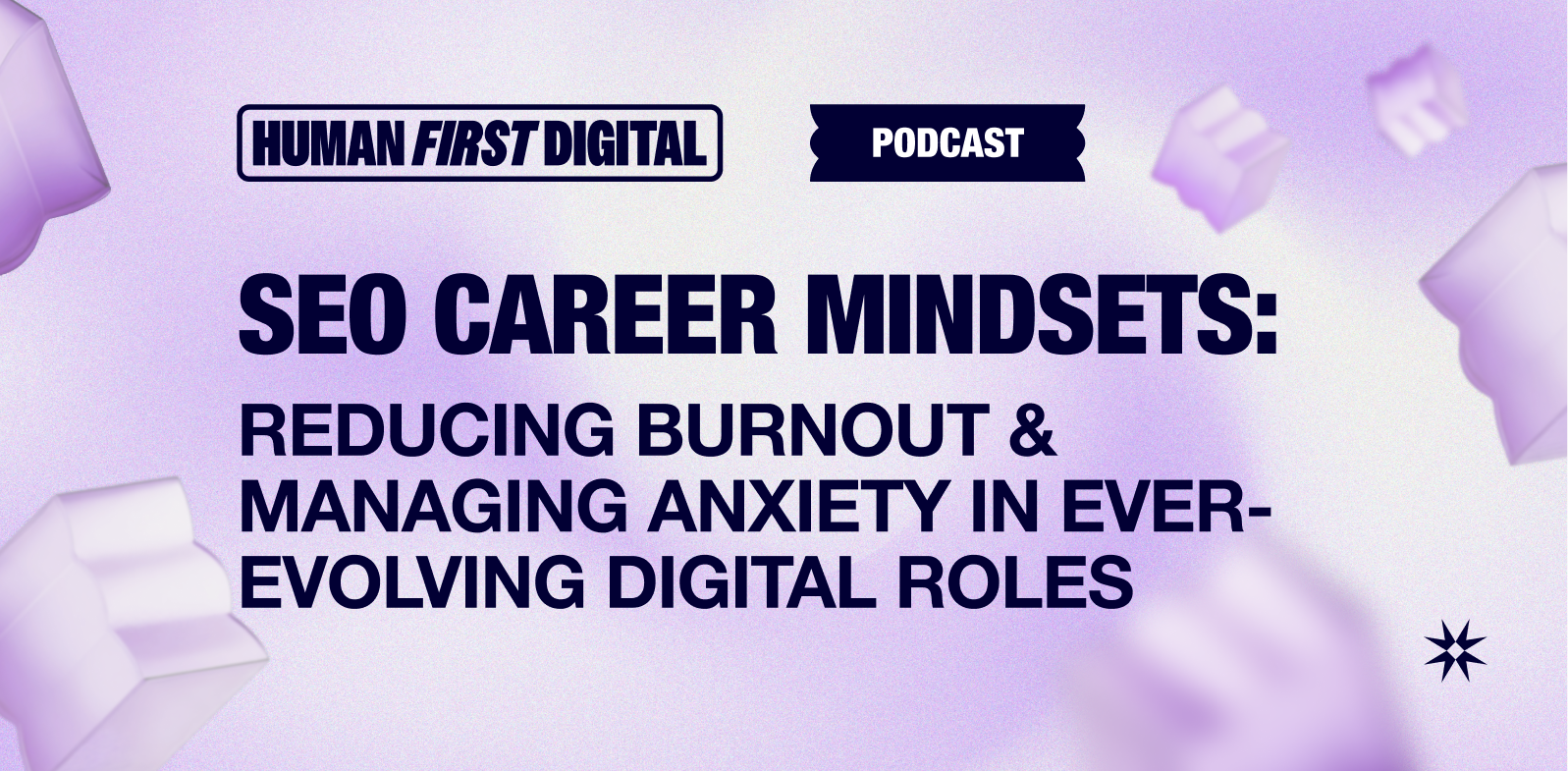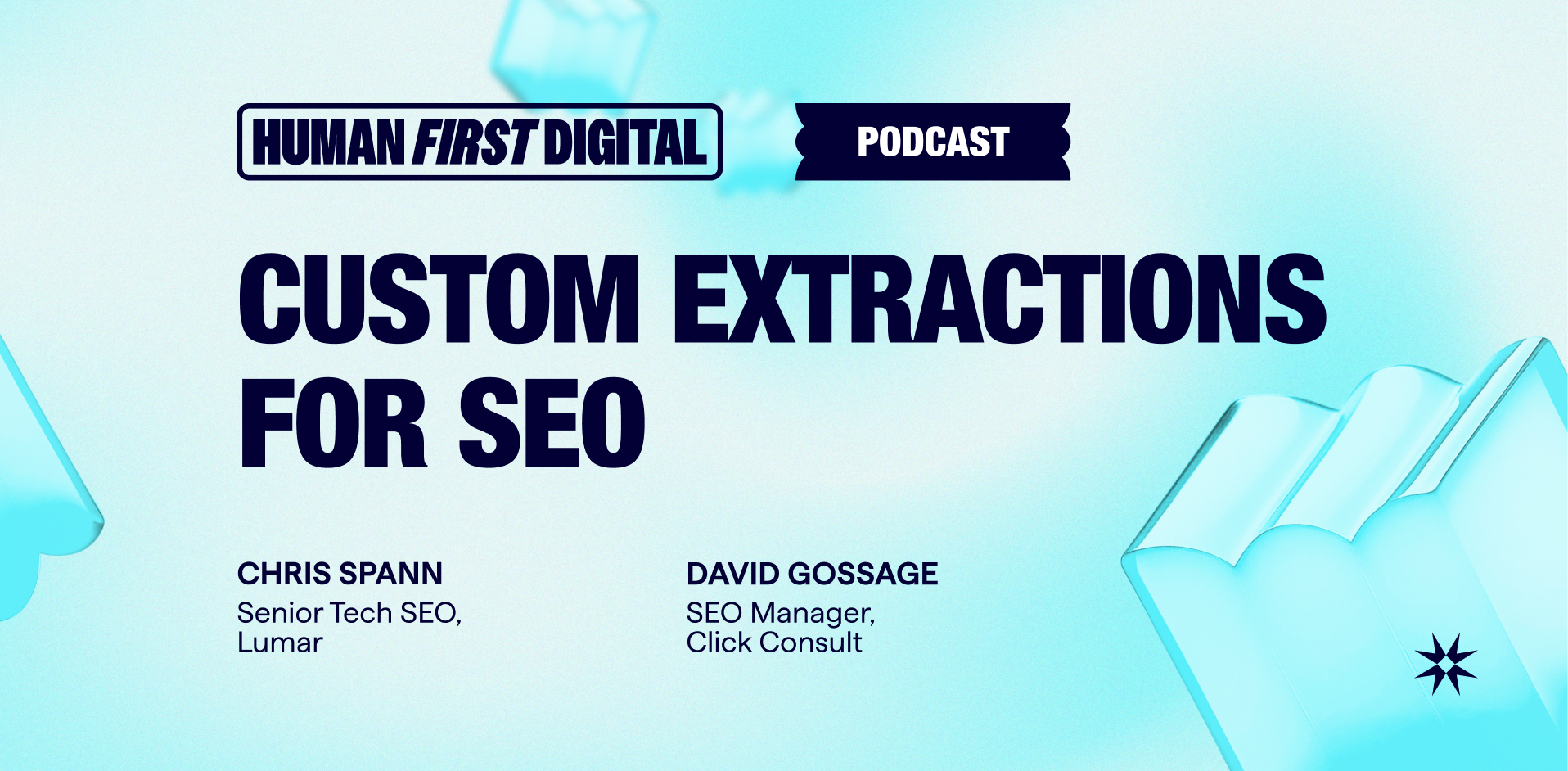Lumar’s SEO and digital marketing interview series continues in this conversation between Senior Technical SEO Jamie Indigo, of Lumar’s professional services team, and Monet Blake, Senior SEO Director at Tug Agency.
The two discuss Monet’s presentation at BrightonSEO earlier this year, and how she keeps small sustainable fashion brands discoverable in the search engines despite the competition from huge fast fashion brands.
Listen to the full interview below, or read on for an abridged transcript.
You can also check out Lumar’s full set of SEO and digital marketing expert interviews.
Jamie: My name is Jaime Indigo, from the Lumar Team (formerly Deepcrawl!), and I have a wonderful guest here with me, Monet. Pleasure to meet you.
Monet: Oh, lovely to meet you.
Jamie: So Monet Blake just gave her very first onstage talk here at Brighton SEO. Tell me all about it.
Monet: Yeah, it was actually my first talk in general. I’ve done a few industry training sessions and some bigger, wider talks within my client industries and things. But for an SEO talk, this is actually my first ever. So it was amazing. I was very excited beforehand, got onstage, felt super nervous, and had the driest mouth ever. It literally went from 0 to 100 and I felt like I was chewing straw, but it was really great! It was something I’m super passionate about, the topic itself. So that really helped.
eCommerce SEO for sustainable fashion brands competing against fast-fashion Goliaths
Jamie: Tell me about that topic. What did you present today?
Monet: My title was “David vs Goliath: the rise of sustainable fashion against fast fashion giants.” So it was essentially a topic that looked into fast fashion conglomerates within the space, who are obviously the Goliaths, and then tried to counter that with the smaller, more sustainable contenders who are really trying to… I wouldn’t even say they’re trying to compete with the Goliaths, because if we look at them on a social and environmental…
Jamie: They have different objectives.
Monet: Very, very much so. But I think what they’re trying to do, is really, really help inspire consumers into considering alternatives to the fast fashion giants. So when we think of fast fashion, I immediately think PrettyLittleThing, Boohoo, Shein, Missguided, you know, there are a plethora of those contenders, and the real big hitters, within the fashion world. But it’s very much the smaller, more sustainable brands who are trying to just, I think, give us an alternative.
And I think they are trying to tackle some of the pain points within fashion that we’ve seen. So price being one, quality, and really trying to double down on the waste and the overconsumption that we are seeing at the moment. Just trying to get people on board with a more environmentally friendly and a more conscious shopping behavior and pattern.
That was essentially the shopping and sustainability side of things, but then that was actually applied to the e-commerce space. So really looking at how these big Goliath websites are hindering their online presence, and their online space, because of the amount of churn that they’re doing. So the successive churn of new releases, daily, has a wider impact of, obviously environmental and social, but then also online as well.
So really looking at tapping into that, and how the Davids — the smaller, sustainable brands — can capitalize on [fast fashion’s] weaknesses. That was the main theme and, hopefully, I captured that and people felt empowered and inspired after the talk to go out there and try different things, maybe explore some of the tactics I mentioned and see how they can apply that to their website and try to own their own space.
Jamie: The principles here apply across verticals. So fashion is one. You’ve got these big brands who are churning out new lines every week. It’s the clothing that you joke if it makes it through one wash it’ll wear for ten years, but they rarely ever make it through one wash. There are also brands that are known for wild promotions, where it’s like, you can buy a bikini for a penny.
So it’s very hard to think, “Ah, I’m going to get my smaller brand [noticed alongside these giant companies], whose goals are much different.” You’ve got this domineering group of fast-fashion giants and you’ve got these smaller companies that are focused on what their values are and what they bring to the table.
But actually, strategically, as an SEO, when you have a smaller client like that up against some massive sites, [those larger sites often] have some critical blindspots that you can exploit.
Monet: One hundred percent.
Jamie: I really enjoyed your talk, you were in a great panel with Areej and with Luke. Just a phenomenal eCommerce talk… The auditorium, too, was completely packed.
Monet: It was really exciting. There were definitely some nerves. But it was great. Like you said, Areej and Luke were great speakers. And they gave me a lot of confidence beforehand, [when] watching them, to then put that energy into my talk as well. It was an amazing morning.
Jamie: What inspired you to start speaking?
Monet: Well, I think it was, originally, the typical agency conversation of, “We’ve got a spot at Brighton, who wants to talk?” And it sort of went from there.
I’ve been in SEO now for about six years, and I felt like maybe it’s time I step up and actually talk about something I’m interested in, put my thoughts and my opinions to a wider audience.
But then it became actually a passion and it became a really good opportunity for me to go out there and to discuss issues and interests that I have.
I massively have an interest in the fashion industry and it’s from a style perspective; I love clothes, I love fashion, I really am interested in that. But then in recent years I’ve taken a step back and thought about my impact on the wider world by buying into trends and buying into, you know, “you need more.”
Admittedly, I had a stint as an influencer on Instagram, so I was there, you know, looking and getting gifted and paid partnerships with brands and didn’t really, I don’t think, consider the impact that I was having. And there’s a conversation and debate within the industry around, “Is it an influencer’s responsibility to talk about sustainability and the wider environmental impact?”
And I know some who don’t think that is their responsibility, because they put the onus on the bigger conglomerates. And whilst I do think, yes, PrettyLittleThing, Boohoo, etc., etc., are all responsible, and they shouldn’t be trying to greenwash and try to manipulate that perception, it really—
Jamie: But greenwashing is a sneaky marketing tactic. For those who don’t know, tell me what greenwashing is.
Monet: Of course. So greenwashing is essentially where a brand will take a sustainable or sustainability message and then apply it to their processes, whether it be their supply chain or the products themselves. They may say that they use environmentally friendly materials and products. It could be that they say that their supply chain is more environmentally friendly. So they look at like reducing emissions through distribution.
I think if you live in a larger city, you’ll often see that they’ll say that it was delivered by a zero emissions company, which means that they maybe used an electric car or an electric van. But it’s essentially taking those principles of what makes clothes and the fashion industry, or industries in general, more sustainable. But they pick and choose. They’re very selective over what they do in order to then be able to say, “Oh, we’re sustainable.”
So you could have a product line that uses, I don’t know. It could be that it’s made with 15% organic cotton, which is a very, very small percentage of the overall makeup of a piece of clothing. But because it has that 15% of organic materials, they will then start saying that they’ve got a sustainable line, their products are sustainable, they’re really about sustainability.
You can take, for instance, I think it’s PrettyLittleThing, they’ve just announced that Khloe Kardashian is going to be their sustainability brand ambassador. Yet, when you know her as an individual, she loves taking private jets. The emissions and the consumption there on your carbon footprint are huge, so, again, they’re pushing the sustainability message without doing the work to actually make it sustainable, and I think that’s what consumers are really becoming wiser to.
They know that those practices aren’t sustainable, and they’re very much more judgmental on brands, and they are very quick to call out brands around those things as well.
Jamie: So I don’t think most folks realize that textile waste is the third largest polluter.
Monet: I think, as I said in my talk, that the clothing industry is responsible for 10% of all carbon emissions globally. And yeah, okay, you can think, “Oh, 10% isn’t…” That’s global emissions, just from one industry.
Jamie: And especially when it’s, you know, creating clothing designed to be worn once and very disposable.
Monet: Yes, 100%. And like we said, around trends and things like that.
Jamie: I loved your talk and I think the passion behind it definitely showed through. If you had a walk-on song, what would it be?
Monet: Oh, wow, that’s a really tough question. It’s funny you say that, because this morning my manager sent me a link to “Eye of the Tiger” on Spotify.
Jamie: That is an excellent hype-up song.
Monet: I think for me, personally, if I had to choose one, it would have to be something by Beyoncé.
Jamie: Oh, you can’t go wrong there.
Monet: Absolutely cannot. She’s amazing, and her music is very inspiring. And I think her latest song, “Break My Soul,” where it’s talking about breaking the 9 to 5, and self-empowerment, I think it’s great. That’s exactly what I wanted. I wanted my talk to inspire, to empower. So I feel like I would need an empowering song. So I would definitely choose Beyoncé.
Jamie: I love that. And it does show when you pivot from being the in-house SEO (or at an agency, and giving trainings to your clients) versus getting out in front of other SEOs. I cannot necessarily say my life is 9 to 5 anymore.
Thoughts on SEO challenges & understanding organic marketing ROI vs. paid channels
When it comes to the SEO challenges you see for your clients, what are the top three?
Monet: I think it’s actually trying to navigate the constant algorithm updates. With over twenty algorithm updates within the space of two years, as an SEO, that is always very daunting. I mean, if you’re trying and you’re working towards it, you should see minimal impacts, but you can never be too sure.
But alongside those updates, it’s also understanding what they mean. So, for instance, the latest “Helpful Content Update” (HCU) means that you need to reevaluate your content for the user first. And with a lot of clients, with historic sites and a lot of historic content, it’s getting them on board with adjusting and changing to meet the new demands of Google.
Jamie: I would love for you all right now to go ahead and kill that text div with the “read more” button, if you could just murder it with fire, that would be great.
Monet: Yes, exactly. I think that’s the thing. That actually leads to the next point: the constant battle between functionality and aesthetics. And especially within e-commerce, you know, you’re constantly battling, “I want it to look this particular way,” but you’re like, “But that’s an accessibility issue, that might cause some kind of technical issues.”
I think that’s always going to be a challenge, isn’t it? Always trying to get [clients] on board with the wider picture — understanding that, while they want it to look a certain way, then they need to consider the user. And that’s what Google is pushing. So while we all grit our teeth and hope for the best, it is really about just pushing the user first and trying to get our clients on board to do so.
Jamie: Where does your role fit in your larger organization? You said you’re at an agency, right?
Monet: Yes, I am. We’re a performance agency. So we work across multiple channels online: programmatic display, paid social, PPC. We actually have our own SEO branch within our agency, too. So I am a senior SEO account director at my agency, at Tug. I then lead a pod of clients and manage a team within that.
So we’re actually quite a well-established SEO team with about 15 people just in our London office. Even for an independent, that’s quite an established SEO presence. So [there are] account directors across SEO, across a bunch of accounts, and then we manage our own smaller teams within that.
Within the agency, we are definitely one of the most established channels, which is amazing to see and part of why I really enjoy my role and why I’ve been given so much more opportunity. Because they really do respect SEO as a channel. I think many of you listening probably understand the strife of not always being the most important or integral channel to the business.
Jamie: Explaining the ROI. Because it’s not a quick pull. With paid, if I give you more money, you give me more people seeing my ad.
With organic marketing channels, how do you go about explaining the ROI?
Monet: Well, I think it is always dependent on the industry itself, so you will always have to factor that in. But there is a lot more research you’d have to do versus other channels; you would need to understand the industry overall. Looking at the seasonality of the industry, then your client’s seasonality, and understanding if any wider social or economic factors are going to have an impact on your client as well, that’s really important. Understanding the industry’s really important.
We have a few accounts within fintech, and understanding how the Ukrainian war has impacted them is a massive part of understanding and trying to establish ROI. Because then we have external factors that we can’t control, no matter how much SEO we’re doing, in the way that paid and other channels can.
So I think truly understanding your industry is really important to establish a better picture when you’re putting together the return on investment.
Also understanding your competition – that really helps. And then I think taking the historic data and then trying to apply some of those other factors into your forecasting and your modeling and being very realistic to caveat that there are other factors that could come into play, but I think really understanding your seasonality makes such a difference.
Jamie: I mean, [in] SEO, anything can change at any given moment. Because… reasons.
Tips to get the most out of SEO conferences
Jamie: This is not your first Brighton SEO, you’ve been before. What advice do you have for people who are attending an SEO conference for the first time?
Monet: I would suggest going in with an open mind. I think you always have to remember that the people who are giving the talks are people, and it’s their opinion for the most part. So you may not always agree with the overall context of the talk, or you may not agree with their angle, but you have to respect that it’s their thoughts, their process, their experiences within the industry.
Sometimes it can be very much like one person’s opinion versus another, but it’s a big space. And [it] is always open to interpretation. So I think if you’re coming [to an SEO industry conference] for the first time, be really open to exploring other people’s ideas and concepts, understanding that some talks will also be very much practical, so you can take things away, you can really apply those to your clients in your accounts.
But then other talks are theoretical, they’re leadership talks, they’re trying to get you to think about a specific concept in more detail, or just inspire and empower, like I said, to really get you excited about SEO. Because it can feel demotivating when you’re working on accounts or with clients where you’re not seeing the change straightaway. But hopefully coming to the talk and being here around like-minded individuals, you’ll really feel empowered and want to learn more, do more, try more for your accounts.
And even if you get some pushback, just keep trying. That’s been the main thing. But yeah, that’s what I would hope for anyone coming to the conference for the first time.
Jamie: Well the audience seemed absolutely in love with your e-commerce panel today. A beautiful session. If folks wanted to reach out to you or follow you, how can they do that?
Monet: So I’ve actually been getting a lot of engagement over Twitter. I’m not usually an avid tweeter, but Twitter definitely. I think it’s a great starting point. And then we could pick conversations up.
Jamie: What’s your handle?
Monet: My handle is @MonetBlake. Nice and simple. Super straightforward. Drop me a tweet, reach out, and maybe even find me on LinkedIn.
Jamie: Wonderful. Thank you so much for joining me today. I hope you have an amazing rest of the conference, and hopefully we’ll see you again in the future.
Monet: Amazing. Thank you so much.
Jamie Indigo can also be found on Twitter — and on Lumar’s professional services team.
Our professional services team works directly with Lumar clients to provide bespoke technical SEO guidance, SEO audits and website reviews, tailored organic search strategy advice, and much, much more. Want to work with Lumar’s expert tech SEOs? Get started with Lumar today!





